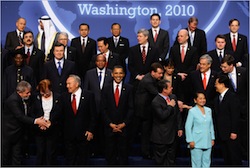Obama Takes Pragmatic Steps Towards Zero
April 19, 2010
Featured Image
We are happy to serve you a daily summary of the top nuclear policy stories each morning, with excerpts from the stories in bullet form.
Stories we're following today, Monday, April 19, 2010:
President Obama's Farsighted Nuclear Strategy - Jim Hoagland in the Washington Post [link]
- President Obama has turned the once utopian-sounding idea of global nuclear disarmament into a useful tool for U.S. foreign policy.
- His well-conceived, confidently executed three-part movement in statecraft this month should banish the notion that Obama's ambitious nuclear goals spring from naiveté or inexperience.
- I have listened with sympathy but deep skepticism to [George Shultz, Bill Perry, Henry Kissinger, and Sam Nunn's] arguments since first hearing Shultz two years ago describe with great conviction the need to reduce to zero weapons.
- But Obama's calculated step-by-step approach makes me reconsider. He is engaging other nations in an international reassessment of the cost-benefit ratio of nuclear weapons and pressing them for action that would create a world in which the United States could feel safer without those weapons.
Mullen: Diplomacy First On Iran - Reuters [link]
- The nation's top military officer said Sunday that military options existed to try to prevent Iran from getting a nuclear weapon but that diplomatic efforts were the best way forward now.
- "We in the Pentagon, we plan for contingencies all the time, and certainly there are options which exist" for dealing with the Iran nuclear threat militarily, Adm. Mike Mullen said.
- "I worry, on the other hand, about striking Iran. I've been very public about that because of the unintended consequences of that. The diplomatic, the engagement piece, the sanctions piece, all those things, from my perspective, need to be addressed to possibly have Iran change its mind about where it's headed."
The Essence of Obama's Diplomatic Brand - Marc Ambinder in the Atlantic [link]
- Not since the heady summits of the Cold War has an international conclave better reflected an American president's governing style than this week's nuclear security summit in Washington, D.C.
- Never before has the issue of preventing nuclear terrorism been treated with this kind of urgency and international cooperation. World leaders took it seriously, recognizing that Obama had put American political will behind the summit.
- Obama thinks that broadening the conversation is critical to making what he likes to call "transformative" progress. A side benefit: treating smaller countries with the same respect as larger countries pays secondary dividends. Obama's "pull-asides" with several leaders, including some he'd never met, are where seeds are germinated.
What Obama's Nuclear Posture Review Accomplishes - The Bulletin of Atomic Scientists [link]
- After repeated delays, the 2010 Nuclear Posture Review--just the third such effort since the end of the Cold War--is finished.
- The Nuclear Posture Review demonstrates that the nonproliferation agenda is advanced in good faith, not out of some desire to derive benefit from the nuclear weapons oligopoly.
- The connection between nuclear posture and nonproliferation is made in two crucial areas, telegraphed in excerpts released before the full report. These decisions send a credible signal to the rest of the world that Washington regards its nuclear arsenal as a defensive asset, not as a tool of coercion and domination.
A View from the Dark Side
A Treaty for Utopia - John Bolton in the National Review Online [link]
- In fact, there is no compelling reason for the Obama-Medvedev treaty, and there are many reasons to fear its impact. Since the still-incomplete text has just become public, continuing careful analysis will be necessary before we can come to definitive understandings and conclusions.
- Substantively, the most appalling aspect of the Obama-Medvedev treaty is not its specific provisions, but what it reveals about President Obama’s national-security psychology.
- To preserve his precious treaty, he has given Russia a de facto veto over U.S. missile-defense plans. This national humiliation, because it is implicit, in some ways is worse than an express surrender in treaty language: Obama thinks he can conceal it from his countrymen.



